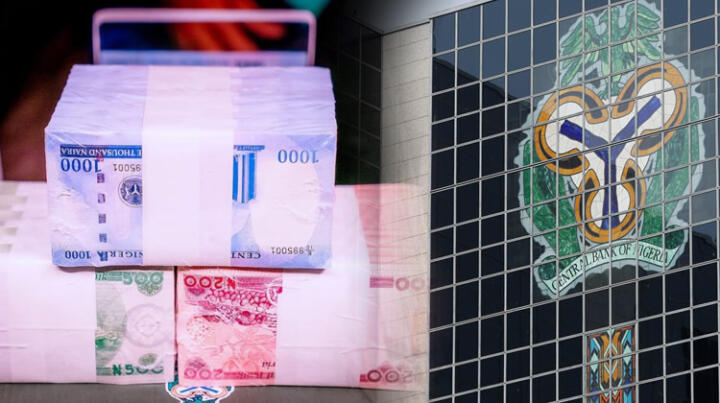Despite recent assurances by the Central Bank of Nigeria that there is sufficient naira in circulation, reports of scarcity have surfaced across the nation.
A comprehensive survey conducted by Infostride News on Wednesday has corroborated the scarcity in various regions, including Abuja, Lagos, Kano, Kwara, Gombe, Edo, Sokoto, and Ekiti States. Bank customers and Point of Sales operators, interviewed by Infostride News, expressed their frustration, citing difficulties in accessing cash for their economic activities.
This scarcity comes in the wake of the Central Bank’s affirmation that an ample supply of currency notes is present in the market, discouraging panic withdrawals from the public. In a circular titled ‘All Banknotes Issued by the CBN Remain Legal Tender,’ signed by Director of Corporate Communications, Isa AbdulMumin, the Central Bank acknowledged the reported cash scarcity in major cities and emphasized the legality of all issued naira notes.

“For the avoidance of doubt, while reiterating that there are sufficient banknotes across the country for all normal economic activity, we wish to state unambiguously that every banknote issued by the Central Bank of Nigeria (CBN) remains legal tender and should not be rejected by anyone, as stipulated in Section 20(5) of the CBN Act, 2007,” the circular stated.
The Central Bank urged the public to refrain from panic withdrawals, assuring that an adequate supply of currency notes is available for normal economic activities.
Public concerns regarding the legality of old naira notes are linked to the issues surrounding the apex bank’s naira redesign policy. In October 2022, former CBN governor Godwin Emefiele announced plans to redesign some naira denominations (N200, N500, and N1000 notes) and reduce currency circulation. The old versions of the redesigned notes were initially set to lose their legal status by January 31, 2023.
This plan faced resistance, leading state governments to take the matter to the Supreme Court on February 3, seeking an extension of the deadline. In March 2023, the apex court invalidated the new naira design policy and extended the validity of the notes until December 2023.
Recently, the CBN declared its intention to extend the validity of the old N200, N500, and N1,000 notes indefinitely. The bank stated that it is working with relevant authorities to challenge the existing court ruling on the matter, filing an application before the Supreme Court seeking an extension for old naira notes to remain in circulation.
According to a report from the CBN, the currency in circulation increased by 3.75% to N2.76tn in September 2023.
However, the impact of the CBN’s naira redesign policy is evident as cash scarcity re-emerges. Visits to banks in Lagos on Wednesday revealed sparse banking halls and ATM galleries. Customers reported limitations on ATM withdrawals, with some claiming that banks were only dispensing N5,000 via ATMs to non-customers.
A Union Bank customer, Ganiyu Tunde, stated that banks were facing challenges due to inadequate supply from the CBN, emphasizing the adverse effects on the public. A bank teller from Guaranty Trust Bank confirmed cash shortages, with customers restricted to withdrawals of N20,000 across the counter.
Interestingly, not all banks are experiencing cash shortages. Union Bank’s Isolo branch and Access Bank’s Oshodi branch were cited as examples where scarcity was not evident. However, the overall concern remains as cash scarcity persists in multiple states, including Abuja, Kano, Kwara, Sokoto, and Ekiti.
In the Federal Capital Territory, Festus Okoromadu expressed frustration over his inability to withdraw from First Bank branches, attributing it to the bank’s network issues. In Kano, some commercial banks were reported not honoring withdrawal requests, and ATM galleries were observed to be dry.
Similarly, Kwara residents highlighted cash rationing by banks, affecting withdrawals to a maximum of N20,000 daily. The scarcity extends to ATMs, where customers are limited to N20,000 withdrawals. This trend is also noted in Ekiti State, where Union Bank’s branch in Okesa Ado Ekiti confirmed insufficient cash availability.
In Gombe State, Point of Sale operators expressed concern over the resurging naira scarcity, relying on traders in the market to access cash. In Edo, both Point of Sale operators and bank customers lamented their inability to obtain cash, with reports of rationed ATM withdrawals.
As the scarcity persists, some banks reportedly limit withdrawals to N20,000 across the counter, attributing the shortage to reduced cash deposits by customers. Customers using other banks’ ATMs are further restricted to N10,000 withdrawals.
The President of the Bank Customers Association of Nigeria, Dr. Uju Ogunbunka, downplayed reports of a cash squeeze, citing recent visits to banks where customers received cash without significant limitations. However, he acknowledged the need to investigate the underlying causes if limitations exist.
Victor Olojo, the National President of the Association of Mobile Money and Bank Agents in Nigeria, called for increased alternatives to cash, emphasizing the importance of clarifying the Central Bank’s role in currency management.
In conclusion, while the Central Bank maintains that there is an ample supply of currency notes, the reported scarcity in various states raises concerns about the effectiveness of current currency management policies. As the situation unfolds, stakeholders continue to monitor the impact on economic activities and seek solutions to alleviate the challenges faced by the public. Infostride News will provide updates as the situation develops.
Support InfoStride News' Credible Journalism: Only credible journalism can guarantee a fair, accountable and transparent society, including democracy and government. It involves a lot of efforts and money. We need your support. Click here to Donate
